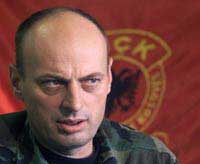Kosovo's PM: independence or nothing

Kosovo's Prime Minister set the scene for continued standoff over the political status of the contested province Monday by refusing to consider any solution other than independence at meetings this week.
Internationally brokered talks between the two sides over the status of Kosovo - currently operating under UN supervision but formally part of Serbia - have been deadlocked because of Kosovo's demand for independence and Serbia's refusal to accept it.
New meetings are due this week in London but both sides Monday refused to give ground over their competing claims with time running out for agreement before a Dec. 10 deadline to end the talks.
Kosovo's Prime Minister Agim Ceku vowed the ethnic Albanian leadership would not accept delays beyond that date to settle Kosovo's future.
"We are going there as a state ... we want to talk about technical issues between two independent states and we want to discuss issues beyond independence," Ceku said.
"If the international community hesitates to make the decision, we are ready and determined to make it, despite all the challenges that might face us," Ceku told reporters after meeting the president and opposition leaders that make up Kosovo's negotiating team.
Serbian President Tadic, at a meeting with Czech President Vaclav Klaus in Prague, repeated Monday that Serbia would refuse to accept Kosovo's independence.
"Serbia cannot have conditions imposed on itself that affect its sovereignty and integrity," he told reporters.
"We will use all legal and diplomatic means to prevent this (independence) from happening."
Kosovo's and Serbia's leaders will hold separate meetings over two days with envoys from the United States, European Union and Russia. Further talks are expected in New York on Sep. 28.
Some 10,000 people died during the 1998-99 war and some 2,000 remain missing in the aftermath of a brutal crackdown by Serb forces on separatist Albanians.
The onslaught prompted NATO to wage an 78-day air war against the former Yugoslavia to try to end the fighting.
Kosovo's daily affairs are run by local institutions dominated by ethnic Albanians, who make up 90 percent of the province's 2 million people, but supervised by the U.N.
Ethnic Albanian leaders and Serbia previously engaged in yearlong talks led by former Finnish President Martti Ahtisaari, acting on a U.N. mandate.
Ahtisaari proposed that Kosovo become independent but retain an international presence to guarantee the rights of the Serb minority.
The plan was backed by the U.S. and EU, but failed after Russia threatened to block any such move in the U.N. Security Council.
Diplomats in charge of the talks will report to U.N. Secretary General, Ban Ki-moon on the progress of the talks by Dec. 10.
Subscribe to Pravda.Ru Telegram channel, Facebook, RSS!


